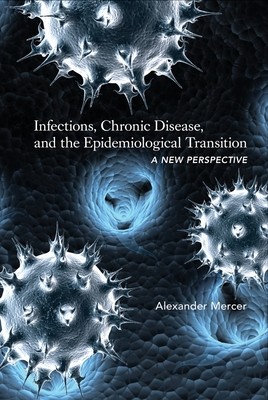
- We will send in 10–14 business days.
- Author: Alexander Mercer
- Publisher: University of Rochester Press
- ISBN-10: 1580465080
- ISBN-13: 9781580465083
- Format: 15.2 x 22.9 x 2.4 cm, kieti viršeliai
- Language: English
- SAVE -10% with code: EXTRA
Infections, Chronic Disease, and the Epidemiological Transition (e-book) (used book) | bookbook.eu
Reviews
Description
Examines the ongoing, worldwide epidemiological transition from acute infectious diseases to chronic diseases as the predominant causes of death, presenting a new theory on how chronic diseases have developed.
Since the eighteenth century, chronic diseases have superseded acute infectious diseases as the predominant cause of morbidity and mortality; age at death has shifted from childhood to older adult ages; and life expectancy, population, and the proportion of older people continue to increase. This transition constitutes a fundamental change in the human condition, and thus an understanding of the historical process behind it is of major importance.This book is the first to document this ongoing, worldwide epidemiological transition in a single country, drawing on records of cause-specific mortality since the eighteenth century in England and comparative data from other Westerncountries. Alexander Mercer discusses possible causes of specific disease trends, reassessing the relative importance of "health interventions" and "standard of living" as determinants of increased life expectancy, and presents anew theory of how chronic diseases have developed. Showing that specific microorganisms are causal agents in some chronic diseases, the study suggests that a new conceptualization of the epidemiological transition is required, one that takes into account interrelationships between infectious diseases, between infections and chronic diseases, and between disorders underlying different chronic diseases. Alexander Mercer is an independent researcher.
EXTRA 10 % discount with code: EXTRA
The promotion ends in 21d.10:49:10
The discount code is valid when purchasing from 10 €. Discounts do not stack.
- Author: Alexander Mercer
- Publisher: University of Rochester Press
- ISBN-10: 1580465080
- ISBN-13: 9781580465083
- Format: 15.2 x 22.9 x 2.4 cm, kieti viršeliai
- Language: English English
Examines the ongoing, worldwide epidemiological transition from acute infectious diseases to chronic diseases as the predominant causes of death, presenting a new theory on how chronic diseases have developed.
Since the eighteenth century, chronic diseases have superseded acute infectious diseases as the predominant cause of morbidity and mortality; age at death has shifted from childhood to older adult ages; and life expectancy, population, and the proportion of older people continue to increase. This transition constitutes a fundamental change in the human condition, and thus an understanding of the historical process behind it is of major importance.This book is the first to document this ongoing, worldwide epidemiological transition in a single country, drawing on records of cause-specific mortality since the eighteenth century in England and comparative data from other Westerncountries. Alexander Mercer discusses possible causes of specific disease trends, reassessing the relative importance of "health interventions" and "standard of living" as determinants of increased life expectancy, and presents anew theory of how chronic diseases have developed. Showing that specific microorganisms are causal agents in some chronic diseases, the study suggests that a new conceptualization of the epidemiological transition is required, one that takes into account interrelationships between infectious diseases, between infections and chronic diseases, and between disorders underlying different chronic diseases. Alexander Mercer is an independent researcher.


Reviews